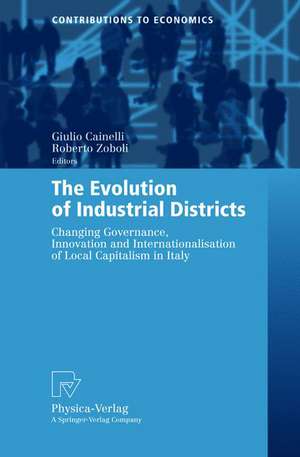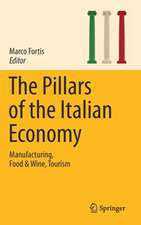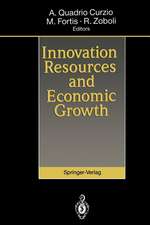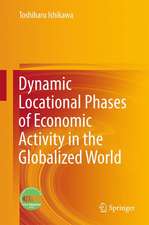The Evolution of Industrial Districts: Changing Governance, Innovation and Internationalisation of Local Capitalism in Italy: Contributions to Economics
Editat de Giulio Cainelli, Roberto Zobolien Limba Engleză Paperback – 19 feb 2004
Din seria Contributions to Economics
- 18%
 Preț: 1001.81 lei
Preț: 1001.81 lei -
 Preț: 90.83 lei
Preț: 90.83 lei - 15%
 Preț: 649.06 lei
Preț: 649.06 lei - 18%
 Preț: 1109.92 lei
Preț: 1109.92 lei - 24%
 Preț: 657.06 lei
Preț: 657.06 lei - 18%
 Preț: 976.54 lei
Preț: 976.54 lei - 17%
 Preț: 361.01 lei
Preț: 361.01 lei - 18%
 Preț: 1027.83 lei
Preț: 1027.83 lei -
 Preț: 283.93 lei
Preț: 283.93 lei - 15%
 Preț: 644.95 lei
Preț: 644.95 lei - 15%
 Preț: 638.24 lei
Preț: 638.24 lei -
 Preț: 394.29 lei
Preț: 394.29 lei - 15%
 Preț: 636.80 lei
Preț: 636.80 lei - 15%
 Preț: 637.78 lei
Preț: 637.78 lei - 18%
 Preț: 723.69 lei
Preț: 723.69 lei - 15%
 Preț: 635.47 lei
Preț: 635.47 lei - 15%
 Preț: 634.00 lei
Preț: 634.00 lei -
 Preț: 392.75 lei
Preț: 392.75 lei -
 Preț: 383.33 lei
Preț: 383.33 lei - 15%
 Preț: 637.28 lei
Preț: 637.28 lei - 15%
 Preț: 636.80 lei
Preț: 636.80 lei - 18%
 Preț: 950.96 lei
Preț: 950.96 lei - 15%
 Preț: 634.68 lei
Preț: 634.68 lei -
 Preț: 387.38 lei
Preț: 387.38 lei - 15%
 Preț: 647.27 lei
Preț: 647.27 lei - 15%
 Preț: 636.63 lei
Preț: 636.63 lei - 15%
 Preț: 639.73 lei
Preț: 639.73 lei -
 Preț: 385.62 lei
Preț: 385.62 lei - 15%
 Preț: 641.85 lei
Preț: 641.85 lei - 20%
 Preț: 649.60 lei
Preț: 649.60 lei - 15%
 Preț: 641.71 lei
Preț: 641.71 lei -
 Preț: 387.96 lei
Preț: 387.96 lei - 15%
 Preț: 645.47 lei
Preț: 645.47 lei -
 Preț: 385.08 lei
Preț: 385.08 lei - 15%
 Preț: 646.62 lei
Preț: 646.62 lei -
 Preț: 383.33 lei
Preț: 383.33 lei - 15%
 Preț: 638.43 lei
Preț: 638.43 lei -
 Preț: 381.21 lei
Preț: 381.21 lei - 15%
 Preț: 642.51 lei
Preț: 642.51 lei - 15%
 Preț: 637.78 lei
Preț: 637.78 lei - 15%
 Preț: 641.71 lei
Preț: 641.71 lei -
 Preț: 384.70 lei
Preț: 384.70 lei -
 Preț: 379.86 lei
Preț: 379.86 lei -
 Preț: 378.34 lei
Preț: 378.34 lei -
 Preț: 384.70 lei
Preț: 384.70 lei -
 Preț: 388.52 lei
Preț: 388.52 lei - 15%
 Preț: 641.71 lei
Preț: 641.71 lei -
 Preț: 381.00 lei
Preț: 381.00 lei - 15%
 Preț: 644.95 lei
Preț: 644.95 lei -
 Preț: 386.00 lei
Preț: 386.00 lei
Preț: 391.99 lei
Nou
Puncte Express: 588
Preț estimativ în valută:
75.01€ • 78.52$ • 62.06£
75.01€ • 78.52$ • 62.06£
Carte tipărită la comandă
Livrare economică 05-19 aprilie
Preluare comenzi: 021 569.72.76
Specificații
ISBN-13: 9783790800951
ISBN-10: 3790800953
Pagini: 360
Ilustrații: XII, 347 p. 13 illus.
Dimensiuni: 155 x 235 x 19 mm
Greutate: 0.51 kg
Ediția:2004
Editura: Physica-Verlag HD
Colecția Physica
Seria Contributions to Economics
Locul publicării:Heidelberg, Germany
ISBN-10: 3790800953
Pagini: 360
Ilustrații: XII, 347 p. 13 illus.
Dimensiuni: 155 x 235 x 19 mm
Greutate: 0.51 kg
Ediția:2004
Editura: Physica-Verlag HD
Colecția Physica
Seria Contributions to Economics
Locul publicării:Heidelberg, Germany
Public țintă
ResearchCuprins
The structural evolution of industrial districts and adaptive competitive advantages.- I. Theoretical Perspectives.- Regional governance and economic development: A European perspective.- Italian industrial districts: Facts and theories.- Modelling the structure and evolution of industrial districts.- II. Firm Ownership and District Organisation.- Institutional innovations in industrial districts.- Groups of small and medium-sized firms in industrial districts in Italy.- Ownership linkages and business groups in industrial districts. The case of Emilia Romagna.- The role of medium-sized and large firms in the evolution of industrial districts. The case of Marche.- Entrepreneurship, labour organisation and labour mobility in industrial districts.- Integration and convergence in the internal dynamics of industrial districts. A case study.- III. Innovation.- Can a Marshallian industrial district be innovative? The case of Italy.- Are industrial districts more conducive to innovative production? The case of Emilia Romagna.- Environmental impact and innovation in industrial districts.- IV. Internationalisation.- Local engines of global trade: the case of Italian industrial districts.- Small multinational groups in the Italian industrial districts: interpretations and empirical evidence from the mechanical engineering industry.
Textul de pe ultima copertă
Italian industrial districts (IDs) recently attracted international attention because their performance during the last few decades contradicted the alleged weakness of industrial structures based on SMEs in "traditional" sectors. The book analyses some developments taking place in Italian IDs and local systems of production that can represent a new stage of evolution for the backbone of the Italian economy. It presents contributions, based on the extensive use of original databases, on three main trajectories of change in IDs. The first trajectory is the increasing role of "groups" of manufacturing SMEs arising from mergers and acquisitions as well as spin-off growth processes at the "family firms" level. The second trajectory is the consolidation of innovation capabilities in IDs. Based on the analysis of firm-level databases, the book presents evidence on the increasing role of formal innovation activities performed by companies in IDs, which partly contrasts earlier results. The third trajectory is the internationalisation process of Italian IDs through both trade and foreign direct investment (FDI). The collection of essays suggests that Italian IDs are again evolving by coherent adaptations which will have, however, uncertain outcomes.
Caracteristici
Includes supplementary material: sn.pub/extras




















